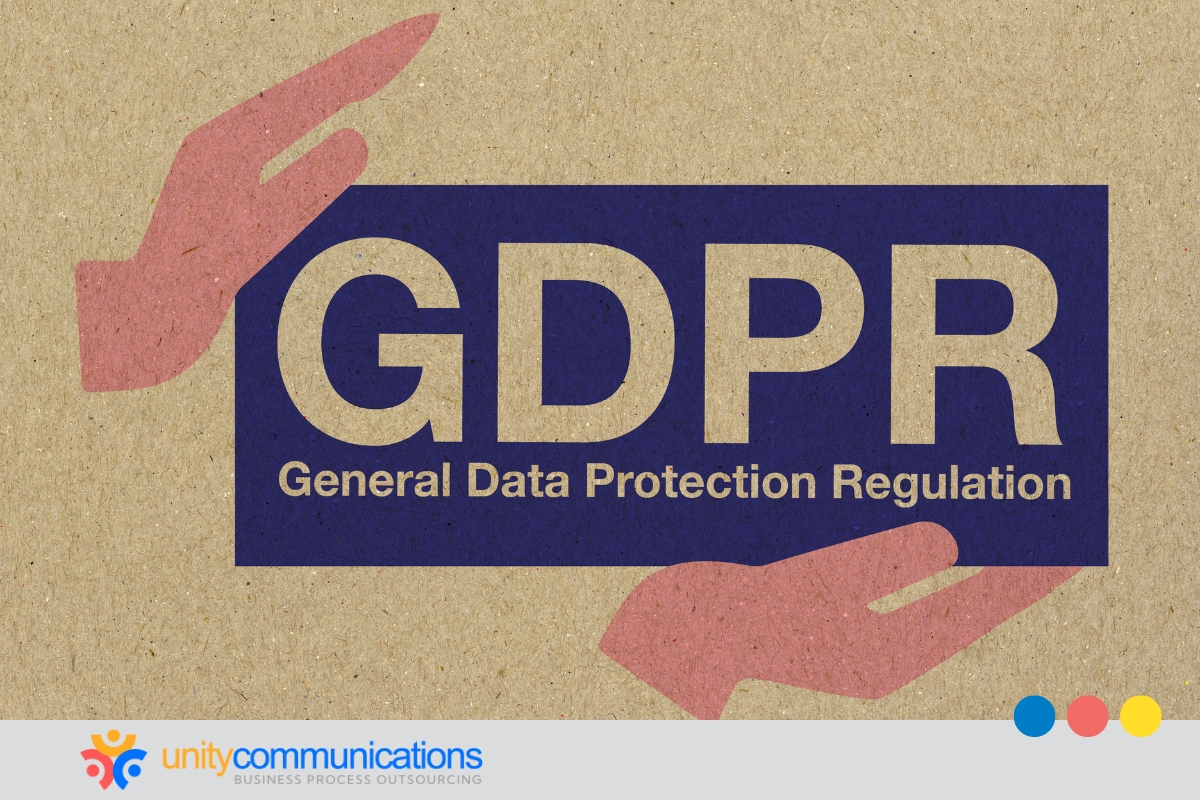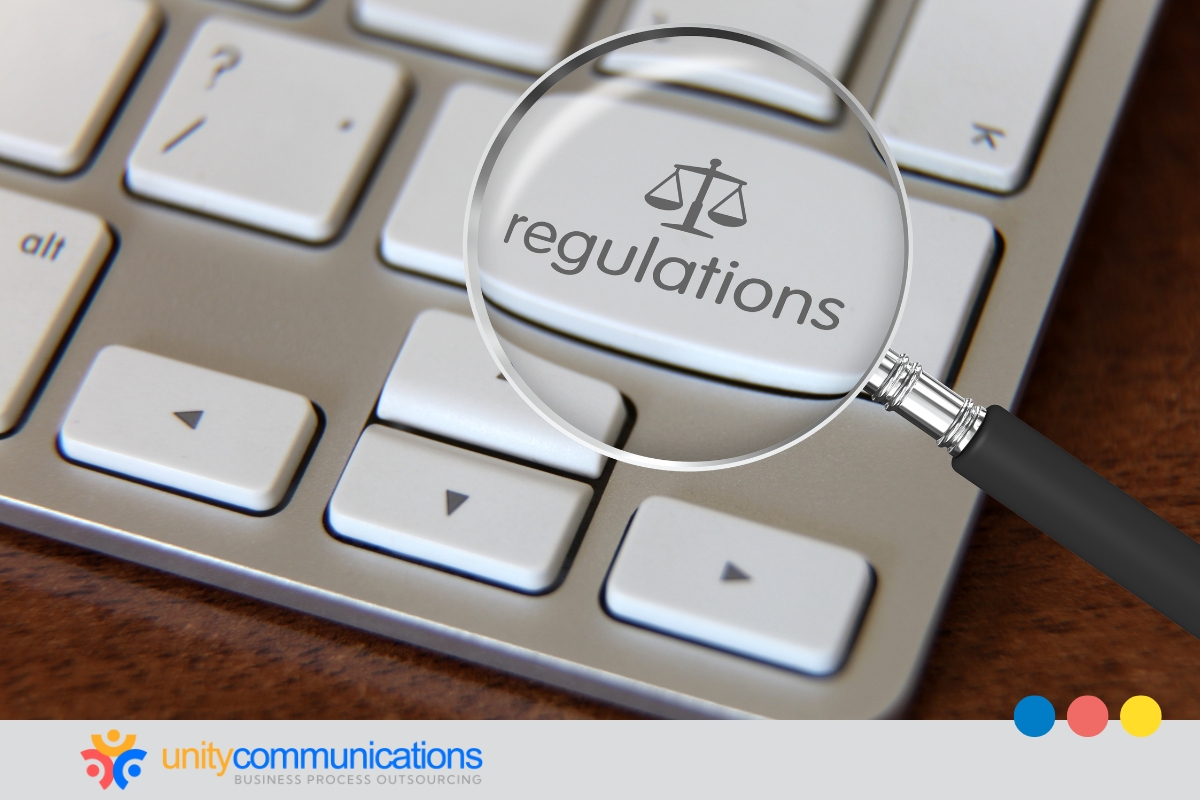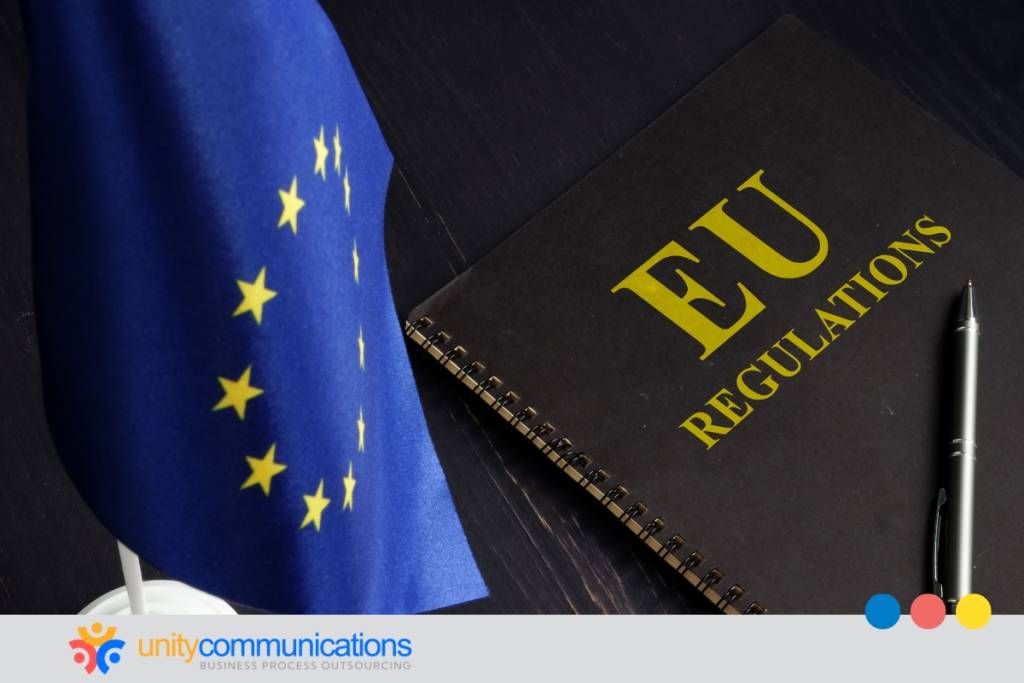Table of Contents
Business process outsourcing (BPO) is widely used to access technological advancements, increase flexibility, and improve cost savings. Nonetheless, outsourcing introduces unique challenges. Consequently, European Union (EU) regulators have released guidelines on outsourcing arrangements to recognize, tackle, and alleviate risks.
Adherence to requirements and standards remains crucial. With new demands and amendments appearing regularly, it’s imperative to constantly oversee applicable standards and guidelines.
This article discusses EU outsourcing policies that businesses operating in the region must consider and strategies to ensure compliance.
EU outsourcing policies and their implications

Due to their broad social and economic importance, several EU policies influence and guide BPO deals. However, EU-based outsourcing companies typically use the key policies listed below as a guide.
General Data Protection Regulation (GDPR)
The GDPR substantially impacts EU-based outsourcing companies, particularly those handling personal data. Outsourced services and activities involving personal data processing require third-party service providers to comply with GDPR requirements.
Under the GDPR, client companies outsourcing such activities must have written contracts with third-party service providers, known as data processing agreements (DPAs) or data processing addendums (DPAs).
These agreements must outline the responsibilities of the data controller (the client company) and the data processor (the service provider) and include specific provisions required by the GDPR. Here’s a closer look:
- Data controller responsibilities. Even when outsourcing data processing activities, the data controller remains responsible for ensuring compliance with GDPR requirements. Hence, it must determine how to process personal data and respond to data subject rights requests and breaches.
- Data processor obligations. Data processors must comply with applicable GDPR obligations outlined in the DPA. These include processing personal data following documented instructions from the data controller, implementing security measures, cooperating with authorities, and assisting the data controller in meeting GDPR duties.
- Security measures. The GDPR mandates companies to implement suitable technical and organizational data security measures. When outsourcing, companies must assess providers’ security measures, including encryption tools, access controls, and regular assessments, to ensure GDPR compliance.
- Data subject rights. Companies must facilitate data subjects’ rights to access and erasure. BPO processes must enable the handling of these requests and ensure provider compliance.
- Data breach notification. GDPR mandates swift notification of data breaches to authorities and affected individuals. Companies need procedures for detecting and reporting breaches to comply with GDPR requirements.
The penalty framework allows fines of up to €20 million, or 4% of the business’s total worldwide revenue from the previous fiscal year, whichever amount is greater.
ePrivacy Regulation
The ePrivacy Regulation has significant implications for EU companies planning to outsource. It primarily concerns the handling of electronic communications data.
This EU outsourcing policy imposes strict requirements on processing electronic communications data, including metadata from emails, phone calls, and internet browsing activities.
Under the ePrivacy Regulation, the fines for non-compliance can also be severe, matching the upper limits set by other major EU regulations, which include substantial financial penalties. As an example of enforcement, the National Commission on Informatics and Liberty (CNIL) imposed €210 million in fines on Google and Facebook for suspected cookie-related infractions.
Here’s a closer look at how this regulation affects companies planning to outsource:
- Confidentiality. When outsourcing activities involving electronic communications data, companies must impose contractual obligations on service providers to maintain confidentiality and implement security measures. Requiring a non-disclosure agreement (NDA) is an option.
- Data security and encryption. The ePrivacy Regulation mandates robust data security measures, such as encryption, to safeguard electronic communications data. Companies must ensure service providers meet these security standards when outsourcing.
- Third-party audits. Companies may need to audit their third-party providers to ensure compliance with the ePrivacy Regulation. When outsourcing, assessing service providers’ data protection practices is essential for regulatory adherence.
- Data transfer restrictions. This EU outsourcing policy limits the transfer of electronic communications data outside the European Economic Area (EEA). Companies wanting to outsource and transfer data to a non-EEA BPO organization must ensure the provider operates in a country with adequate data protection or employs appropriate safeguards.
- Liability. Client companies hold primary responsibility for ePrivacy Regulation adherence, even when outsourcing. Contracts should allocate responsibility and liability for breaches or violations.
EBA guidelines
The European Banking Authority (EBA) issues guidelines and standards to promote consistency in regulating banks and financial institutions across the EU. This EU outsourcing policy affects how financial institutions engage in BPO activities.
EBA guidelines provide detailed requirements for financial institutions when outsourcing critical functions, including risk management processes, data handling, and customer-facing activities. Financial institutions must ensure compliance with these guidelines when engaging a BPO provider to effectively manage operational, compliance, and reputational risks.
The EBA’s guidelines emphasize the importance of robust risk management practices in outsourcing arrangements. Financial services are required to conduct thorough risk assessments, including evaluating the economic stability, operational capabilities, and security measures of BPO providers.
Remediation projects based on EBA guidelines typically address deficiencies or compliance violations identified when assessing outsourcing arrangements within financial institutions. These projects aim to address issues and ensure that outsourcing activities comply with regulatory requirements and best practices.
Here are the steps for conducting remediation projects based on EBA guidelines:
- Risk assessment. Perform a risk assessment to prioritize remediation efforts based on the severity and potential impact of identified deficiencies. Assess risks related to operational and strategic aspects of outsourcing arrangements.
- Gap analysis. Conduct a comprehensive gap analysis to identify non-compliance or deficiencies in existing outsourcing arrangements. This involves reviewing documentation, policies, procedures, and contractual agreements related to outsourcing activities.
- Remediation plan. Based on the gap analysis and risk assessment findings, develop a detailed remediation plan outlining specific actions, timelines, responsibilities, and resources to address identified deficiencies. Ensure that the plan aligns with the EBA’s guidelines and regulatory expectations.
Ensuring compliance with EBA guidelines when outsourcing involves thorough planning, implementation, and ongoing monitoring. Here’s a step-by-step approach to ensure compliance:
- EBA guidelines. Familiarize yourself with the EBA guidelines on outsourcing, including key requirements and recommendations applicable to financial institutions. Understand the scope of the guidelines and their implications for outsourcing activities within your organization.
- Service provider selection. Perform thorough due diligence on prospective service providers to assess their capabilities, reliability, and compliance with regulatory requirements. Evaluate their financial stability, operational resilience, data protection measures, and adherence.
- Contractual agreements. Draft or review outsourcing contracts and agreements to ensure alignment with EBA guidelines and regulatory requirements. Include provisions related to risk management, data protection, security, confidentiality, audit rights, and dispute resolution mechanisms.
Key provisions in EU regulations regarding outsourcing contracts

BPO contracts within the EU are subject to various regulations and legal frameworks that aim to ensure compliance with applicable laws, protect the rights of individuals, and promote fair business practices.
Regulatory requirements governing outsourcing contracts vary depending on the sector and the nature of the outsourced activities. Here are some of the key EU outsourcing policies affecting BPO contracts:
- Competition laws. These laws encompass the Treaty on the Functioning of the European Union (TFEU) and antitrust regulations. They apply to BPO contracts, especially when they involve significant market players. BPO contracts must not contain provisions that restrict competition or abuse dominant market positions.
- Consumer protection legislation. This guideline ensures fair treatment, transparent terms, and appropriate remedies for breaches or disputes. BPO agreements must adhere to consumer rights directives, covering unfair contract terms, access to information, and dispute resolution mechanisms.
- Procurement rules. BPO contracts awarded by public authorities are subject to EU procurement rules, which aim to ensure fair competition, transparency, and value for money in public procurement processes. These regulations oversee advertising, tendering, selection criteria, and contract performance for public entity contracts.
- Intellectual property laws. BPO engagements may involve creating and using intellectual property rights (IPR), such as copyrights, trademarks, or patents. IP laws govern the protection, licensing, and enforcement of IPR and impact the BPO contract terms, particularly regarding ownership, licensing, and indemnification.
- Cross-border trade and services regulations. These rules aim to remove trade barriers and enhance economic integration, impacting jurisdiction, choice of law, and judgment recognition in contracts. So, what can BPO firms do to ensure compliance? They must adhere to regulations facilitating free movement within the internal market.
The bottom line

BPO clients within the EU must navigate a complex regulatory landscape encompassing various legal frameworks governing data protection, consumer rights, procurement, IP, and cross-border trade.
Compliance with these regulations is essential to mitigate legal risks, ensure contractual enforceability, and maintain the trust and confidence of stakeholders involved in BPO arrangements.
Let’s connect if you want to learn more about outsourcing.




